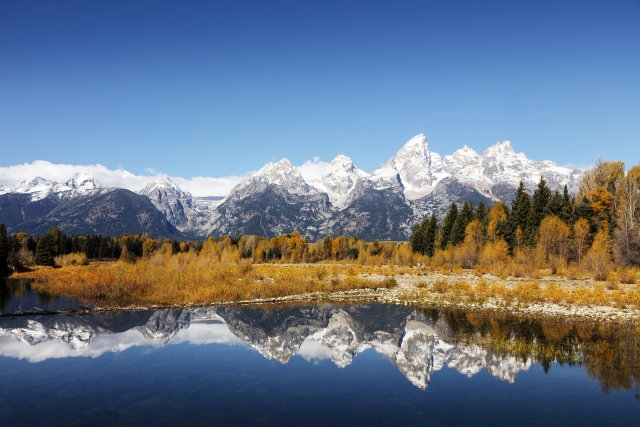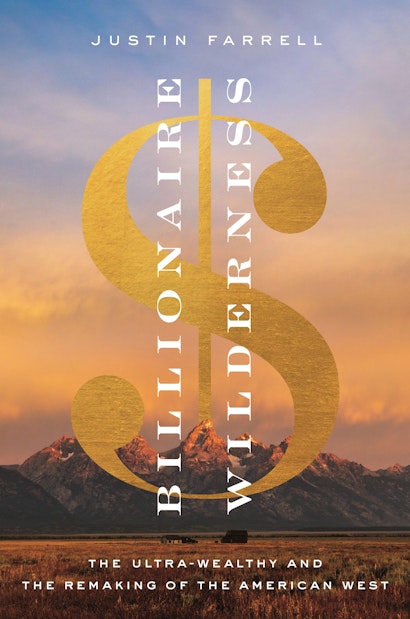Billionaire Wilderness takes you inside the exclusive world of the ultra-wealthy, showing how today’s richest people are using the natural environment to solve the existential dilemmas they face. Justin Farrell spent five years in Teton County, Wyoming, the richest county in the United States, and a community where income inequality is the worst in the nation. He conducted hundreds of in-depth interviews, gaining unprecedented access to tech CEOs, Wall Street financiers, oil magnates, and other prominent figures in business and politics. He also talked with the rural poor who live among the ultra-wealthy and often work for them. The result is a penetrating account of the far-reaching consequences of the massive accrual of wealth, and an eye-opening and sometimes troubling portrait of a changing American West where romanticizing rural poverty and conserving nature can be lucrative—socially as well as financially.
Your book explores the relationship between extreme wealth and the environment. What led you to a project focusing on the ultra-wealthy?
JF: It was the convergence of two paths, one scholarly and one personal. First, there is an unfortunate shortage of careful scholarly work on this growing class of powerful people who now control most of the wealth in the United States. Most of what we have are birds-eye-view level trends from economists or sloppy exposés from zealous critics. Obviously, the economic studies are critically important, but we still know very little about the deeper internal workings of the ultra-wealthy class – unplumbed issues that I believe can only be gleaned through a rigorous ethnographic approach. To make matters worse, we know even less specifically about the relationship between extreme wealth and the environment. Second, being from Wyoming my family would often visit areas like Teton County, so I literally watched over many years this community be transformed into the richest and most unequal community in the nation. Over time I gained a sense that extreme wealth would be the defining factor shaping the West and its environs, now and into the future. To add to that, when I was younger my mom was a house cleaner and I would often accompany her to large homes during the summers. This made me curious about wealthy folks – especially how they see themselves in relation to people like my mom and me. Many years later, and after academic training, I finally had the tools to tests some of these personal puzzles. But it was because of these personal experiences that my questions are more cultural and philosophical and about who they are as people, rather than just simply about cold dollars and cents.
The billion-dollar question on everybody’s mind is: how did you gain access to so many ultra-wealthy people?
JF: As I describe in the Introduction, my dual identity as a Yale professor and a native Wyomingite proved to be a perfect mixture and broke down many of the barriers that have hindered research into and with this group. For example, when I mailed initial letters inviting folks to participate, they were unsurprisingly drawn to the elite prestige of the Yale name because of their value on elite education, but perhaps more importantly, they were very into the fact that I was actually from the exact region of the country that they came to love and romanticize. So, the prospect of participating in this kind of non-threatening nature-oriented study, from an Ivy institution, nonetheless, was very appealing. And on top of all that, it was especially neat to do it with a person who was from the elite world, yet at the same time wasn’t, because I fit their romantic stereotype of a rural ignoble Westerner.
Separately, this class of people can be quite paranoid about unknowingly becoming the victim of an exposé, so I was very clear about anonymity and that I was not out to get them, nor would I be unfair in my analysis. Of course, that is not to say that the book is uncritical or overly sympathetic. But, as I quickly discovered, just like anyone else, folks out there always enjoy talking about mountains, wildlife, recreation, hiking, and other non-threatening mattters that remove them from the high-pressure and precarious rat race in which many of them continue to run. In other words, this unique setting provided a unique entry point for me, and allowed them to let their guard down, even for many of the more contentious issues we discussed.
This is a book about the ultra-wealthy, so what role did your interviews with the working poor serve?
JF: I came to know very intimately the inner and outer worlds of the ultra-wealthy, yet I sensed that it was just as important to know what people at the bottom of the socioeconomic strata thought of them in return. The working poor make possible the nature-loving lifestyles lived by the ultra-wealthy through their low-wage jobs in the services, construction, and caretaking industries. Many of them are undocumented immigrants. For the ultra-wealthy, being out in nature erases class distinctions, and thus the affluent would claim to have authentic relationships with the working poor class and bond over enjoying the environment. They’re all just out there enjoying nature together. What is not to love? But were they really friends? What did the working poor think about all the wealth that has accumulated at the top in recent years? Was everyone in the community getting along, as it seemed? Did everyone love nature in the same way? In some cases, I interviewed working poor employed by the ultra-wealthy, whether it be their house cleaner, nanny, or home repair person. Through what I call “paired experiences,” I show how they each see themselves in relation to one another. Rather than only relying on the ultra-wealthy’s telling, I use these paired experiences to triangulate the on-the-ground reality of community life in the richest and most unequal community in the nation. It was methodologically cumbersome, but I’m glad it worked out in the end.
How does the book contribute to ongoing national conversations about wealth inequality?
JF: It directly links the problem of wealth concentration to the environment, but not in the ways we might expect. The book doesn’t neatly follow the predictable environmental storyline where we learn – gasp! – nature is ruined because of rapacious greed and resource exploitation. Instead, I flip the story on its head, and show the ways that environmental conservation – which is often assumed to be altruistic and pro-social – can become a tool for increasing one’s social prestige and economic standing. Love of nature provides a license to engage in behaviors that appear to be altruistic or good for nature and rural people, yet in the end prove to be a veneer that actually perpetuates gilded consumption (e.g. 5,000 sq ft. luxury “cabin” in the mountains), self-serving philanthropy, increasing inequality, and reinforcing many of the problems our current economic and political systems have created. This environmental veneer involves what I call “Connoisseur Conservation.” In other work I’ve written about industry efforts to spread misinformation about climate change and obstruct climate solutions. Those dynamics were straightforwardly about economic incentives and corporate strategies for self-preservation. But here in this book the issues are more complex, yet also more interesting because of the thick ironies around every corner, and the social-psychological and philanthropic work the ultra-wealthy do to wrestle with and morally justify the contradictions that exist.
What about climate change? Where does that fit into the discussion?
JF: I found that, like many Americans, some were concerned, and some weren’t, but there was hardly an appetite for meaningful action. However, there is a big difference between the average American and the average ultra-wealthy person when it comes to climate change. A good deal of these folks have made their fortunes through financial and industrial practices that have greatly contributed to global ecological ruin. Of course, like many of us, these folks aren’t necessarily living their lives in bad faith, and they’re not intent on ruthless domination. Yet, here we are. And to make matters worse, the poorest among us will bear the burden of drought, rising seas, disasters, and all the other effects we’re still trying to understand.
I write about how many ultra-wealthy become environmentalists after moving to ecologically pristine areas like this, yet the issue of climate change is rarely, if ever, an environmental priority for them. Instead, they tend to focus on smaller de rigueur conservation issues that are mostly inconsequential in the face of rising global temperatures, or in some cases, simply provide them tax breaks or protect their elite experience of “pure” nature. The book has many stories about these tensions, including from the perspective of the working poor, some of whom see through the self-serving hypocrisy. Or as one working poor interviewee put it to me, describing his views of ultra-wealthy environmentalism: “I’m like, `You just flew here in a Gulf Stream. Why do you care about recycling?’ Recycling just doesn’t matter, you know, you’re keeping this 15,000-square-foot mansion heated year round, and empty, and you’re worried about recycling? But you know, I guess it made him feel better.”
Who should read this book?
JF: The book is written for a general audience and is of interest to anyone curious or concerned about our new gilded age, especially as it relates to the environment. I’ve done my best to cut through the sloppy stereotypes about the rich, as well as to dig beneath the impersonal aggregate national trends about income inequality, to produce an in-depth picture of wealth from the inside out. I hope that the book is a reliable piece of scholarship contributing to several social science fields – but more importantly, can serve as a road map for lawmakers who need to think harder about the future of rural economies and communities, and the ecosystems that sustain them.
Through the many stories in the book, readers will also get an inside look into the world of wealth, whose lives are in some ways like the rest of us, yet in other ways they occupy another existential stratosphere. And like all of us, they face social and economic dilemmas that they attempt to resolve. Finally, the book should be of interest to NGOs and other organizations who work in the philanthropic and environmental sectors. These readers will find value in the up-close nature of the research, which hopefully unearths some unique insights for change-makers about how the wealthy think about themselves, their fortunes, and the social and ecological communities they’ve increasingly come to love to death.
Justin Farrell is associate professor of sociology at Yale University in the School of Forestry and Environmental Studies. He is the author of the award-winning book The Battle for Yellowstone: Morality and the Sacred Roots of Environmental Conflict (Princeton). A native of Wyoming, he lives in New Haven and Denver. Website: justinfarrell.org Twitter @J_Farrell

